Working with key opinion leaders – because that’s who we’re talking about, I won’t force you to scroll half of this article to find this out – can be an effective way to broaden your audience and build trust with it. Let’s take a look at what distinguishes KOLs from “regular” influencers and how to choose those who match your brand needs.
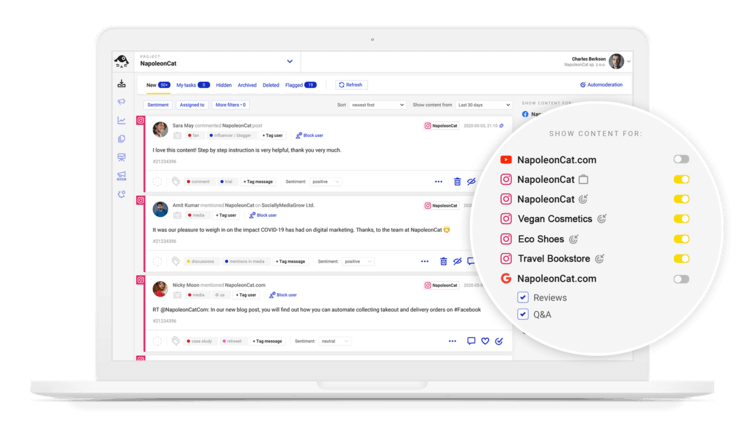
Simplify Social Media
Management with One Tool
- Manage & reply to comments and DMs in one place.
- Monitor ad comments from multiple accounts.
- Automate answers to repetitive questions.
- Schedule posts to multiple accounts, on desktop.
- Analyze performance and monitor hashtags.
- Keep track of your competition.
- Create or schedule in-depth reports in seconds.
What are KOLs in marketing?
Influencer marketing has been around for some time now, effectively helping brands grow their audiences. But there’s not just a single definition of an influencer.
We have micro influencers, celebrity influencers, nano influencers, mega influencers, thought leaders… We also have KOLs – key opinion leaders.
Now, what’s the difference?
The main one is that key opinion leaders, a.k.a. KOLs, are generally considered experts in a particular field. And they also have a pretty niche audience within that field. And yes, they might also be celebrities, authors, speakers, and influencers, but bringing their knowledge and subject matter expertise into the picture.
So, they’re not made by their numbers (though they will often have large followings, as key opinion leaders) as much as by their subject matter expertise.
They also usually won’t recommend products or services directly, but rather become brand ambassadors of sorts. (Think of a sports player endorsing a car brand, for example.)
KOLs might also not be content creators themselves but rather require more content and campaign production when working with a brand. They also usually don’t live off social media and content creation – it’s mostly a side gig for them
Okay, some examples might definitely help.
So a KOL could be Ariana Huffington, Seth Godin, or Tim Harford:
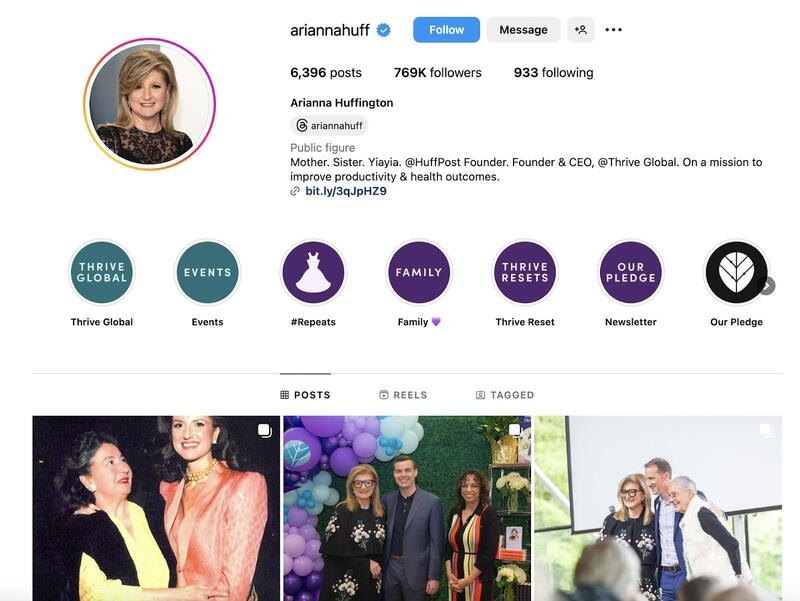
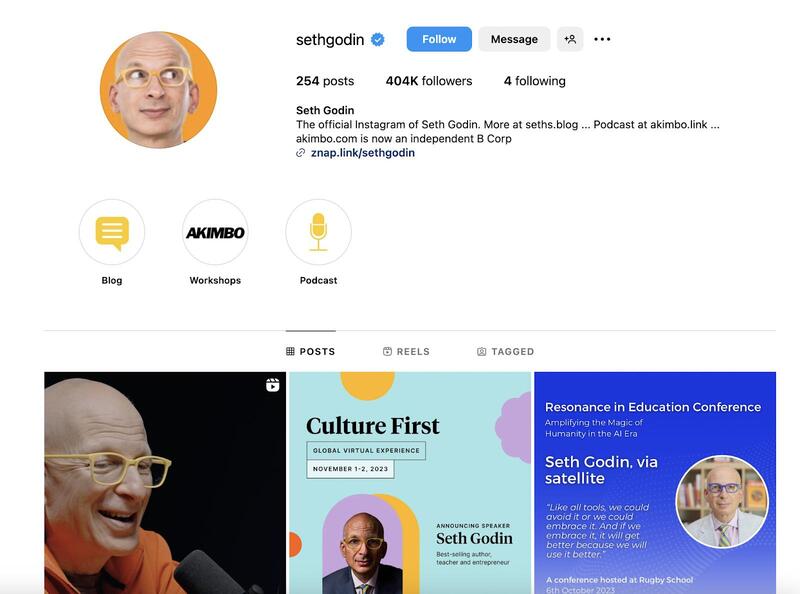
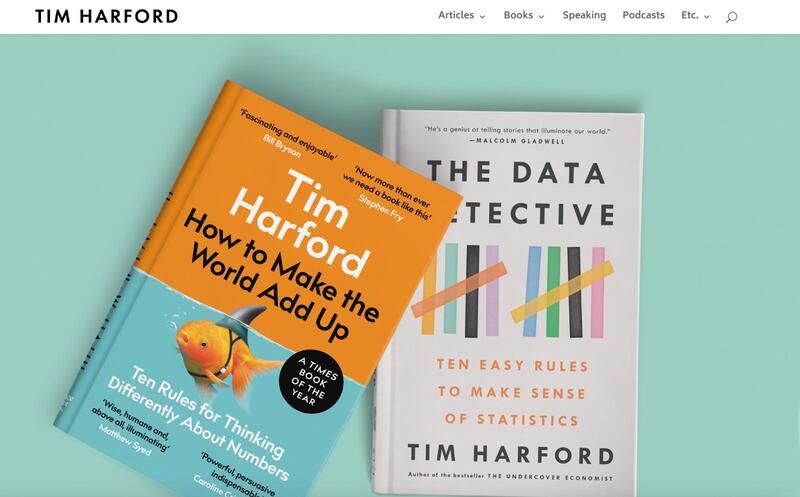
Each of them is an expert in their respective fields, including journalism, business, marketing, and economy. And they did it first before becoming widely known on social media because of their experience and/or knowledge.
They’re followed for their opinions rather than their celebrity status (though these things can overlap the more popular a KOL becomes.) Whichever it is, brands like to get affiliated with KOLs to reach their audience and increase brand awareness among a specific target group.

Protect your social media from trolls
Automatically hide or delete comments from Facebook and Instagram trolls under your organic posts and ads, for all your profiles at once – with an all-in-one social media tool.
Why you should work with KOLs

There are at least several reasons why brands pursue KOL partnerships:
1. Reach more people in a specific market segment
Working with KOLs is a chance to get your brand exposed to a bigger chunk of your target audience. But what’s so effective about this type of brand exposure is that you’re usually exposed to an already highly engaged audience.
This might not be as true for the KOLs that have achieved sort of a celebrity status and have huge followings – because the more niche an audience is, the higher the engagement is likely to be. But in any case, it’s definitely a chance for some good quality relationship-building with an audience.
2. Support sales
While working with KOLs can be excellent for building brand awareness, it does have impact on sales. It might be the case where you build long-term impact more than a quick sales opportunity, but it will definitely boost sales at some point down the line. Because that’s what brand building is for in the first place.
And if they endorse your brand, and by extension, your products or services, that can be a key factor for people in their audience to start buying from you.
3. Build trust
Again, this follows from the brand-building point. Successful key opinion leaders (and influencers in general) have a way of building trust with their audiences that you can benefit from as a brand. And since KOLs have the added value of their expertise, they might be seen as more trustworthy than the typical influencer online.
And I don’t have to tell you how invaluable trust is when it comes to building relationships with your customers.
4. Build authority
This is closely related to the previous point. When you’re endorsed by an expert in a field, you look like the real deal. That’s something that ordinary influencers can’t really do for you (in most cases, anyway.)
What’s more, working with a key opinion leader opens up doors for you to getting more KOL partnerships, letting you adopt KOL marketing as a long-term marketing strategy.
5. Reach beyond social media
Another thing that sets KOLs apart among the general influencer group is that their influence reaches beyond social media (and sometimes, they might not even be particularly active on social media themselves.)
They build their following across channels – from in-person industry events (usually a big one for KOLs) to industry-related media, research, podcasts, etc.
So when you think about it, that’s the kind of brand awareness that’s hard to build using just online channels, because you reach people who might simply not be there.
How to find the right KOLs for your brand
Now, just as with influencers, you need to find the right KOL to actually benefit from the partnership. Here are a few pointers.
Start with your goals for the KOL partnership
Yeah, it might sound obvious, but we both know what it’s like. So, make sure you know what you want to achieve by working with the key opinion leader, and how you’re going to measure it (a.k.a., have some KPIs ;)) Basically, you need a whole KOL marketing strategy.
Besides growing your reach (whether on social media or across channels), is there a specific increase in sales that you want to reach, or can you put a score on it? This will help you see how the campaign is working.
Look for matching audiences
This might, but doesn’t have to mean looking for someone in the exact same industry.
You can absolutely have someone representing the same niche, which makes total sense. But you can also look outside of it for somebody who complements what you do and speaks to your potential audience. (Think about the sports person/car example.)
Of course, this also means you need to understand your audience really well and know the type of KOL that they’ll appreciate your brand to work with.
Research the KOL well
Look for:
- past brand partnerships. If they’ve done it before, they’ll obviously be much more experienced in the subject.
- what types of brands they’ve worked with before and what results those brands got – in terms of growing their followings, sales, etc.
- their credibility and authenticity (plus any potential crises they might’ve been involved in before.)
- their values and the type of content they put out there. You don’t want to work with someone who clearly has very different values or represents a completely different worldview than your brand and your audience.
- their social media presence. Dig into some social media analytics to see what they post, how frequently they do it, and what engagement they get. As I’ve said before, many KOLs are not super active on social media, while if your goal is to build a bigger social media presence, you need to look for someone that’s actively building a social media community.
Look at what others in the industry do
I don’t mean copying your competitor’s ideas. But take a closer look at how other brands use KOL partnerships and look for gaps that you can fill with your KOL marketing efforts.
Also, look outside of your niche and at other industries to get inspired by successful KOL brand partnerships.
4 tips for working with KOLs
Trust the KOL
Partnering up with any kind of influencer requires finding the balance between brand goals and what the influencer brings to the table. And since KOLs are experts in their field (that’s why you’re working with them, right?), they will probably have lots of insights and experience that you should take into consideration.
Plus, it’s a partnership, so building that trust with your partner is crucial for them to feel valued and put their best foot forward for your brand.
Engage in the partnership, too
If you want to get the best results from your KOL partnership, invest time and effort (in addition to money) in it. It’s a partnership, so a lot of the work is about true relationship-building.
It’s the only way to have someone become a genuine brand ambassador who is willing to vouch for the brand they work with in front of their audience.
Set clear goals and track them
Make sure you’re on the same page with the key opinion leader as to what your partnership is supposed to look like and what results you’re looking for. And when you have clear goals, keep tracking them and revising how the partnership works and what needs improving or changing.
Support your team with the right tools
Look into social media management tools to create and publish content within your KOL marketing campaigns, manage conversations it sparks, and analyze results.
Here’s how NapoleonCat can help support your KOL campaigns:
- Plan and schedule content for your social media channels as well as the KOL’s channels. Depending on the terms of your collaboration, the KOL can have access and post content on their own, or your team could take over.
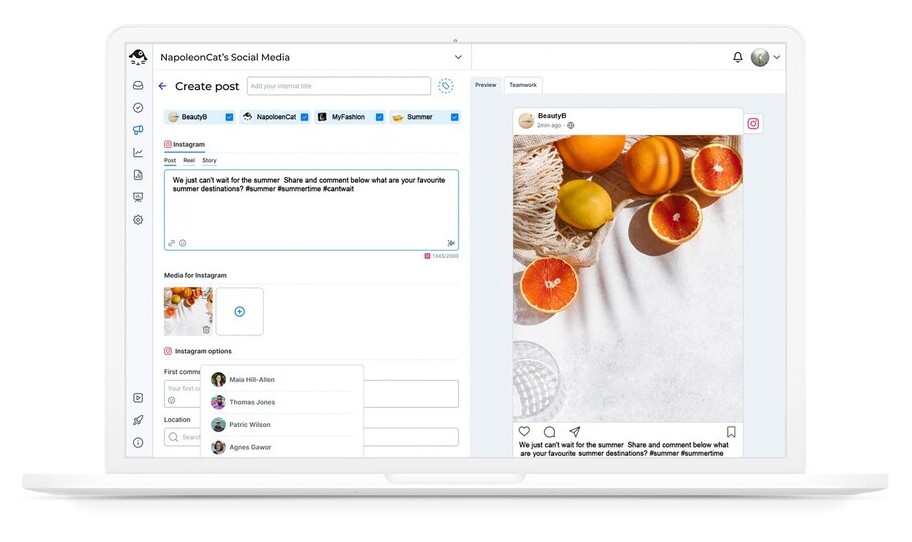
- Moderate comments and messages generated by the content to keep the conversation with the audience alive. It’s key to growing the engagement you’re after.
- You can Auto-moderate some comments or questions – especially if you’re getting spam or troll comments, which you can then automatically remove.
- Analyze results, such as engagement or follower growth – both on the brand channels and the KOL’s channels. You can also automate regular reporting to keep a close eye on how the results change over time.
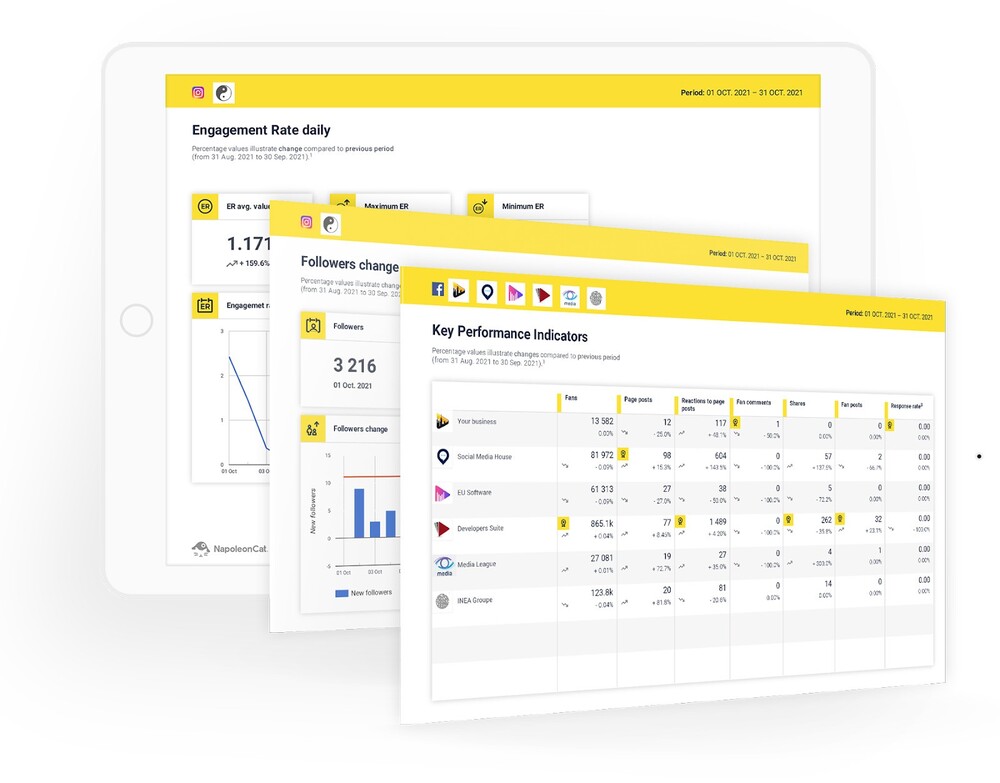
- The Analytics feature will also prove indispensable in the research phase while you’re looking for and comparing KOLs that could be right for your brand. You can monitor any public social media account on Instagram, LinkedIn, Facebook, and YouTube. So if your potential KOL has an expert YouTube channel, you can easily see how their content is doing and what’s the engagement potential for your brand.
We highly recommend you test NapoleonCat completely for free – no credit card required 😉

Simplify Social Media
Management with One Tool
- Manage & reply to comments and DMs in one place.
- Monitor ad comments from multiple accounts.
- Automate answers to repetitive questions.
- Schedule posts to multiple accounts, on desktop.
- Analyze performance and monitor hashtags.
- Keep track of your competition.
- Create or schedule in-depth reports in seconds.
Ready to work with a KOL?
Give NapoleonCat a try to research KOLs on social media and find the best KOL for your brand.
You may also like:
- Top 10 YouTube Influencers To Follow
- How to Create a Social Media Strategy
- Meta Business Suite Message Scam – How to Avoid Getting Tricked
- Ready-To-Use Social Media Marketing Strategy for Small Business
- How to Use LinkedIn SEO to Reach the Right Audience
- The 8 Best Marketing YouTube Channels To Follow





